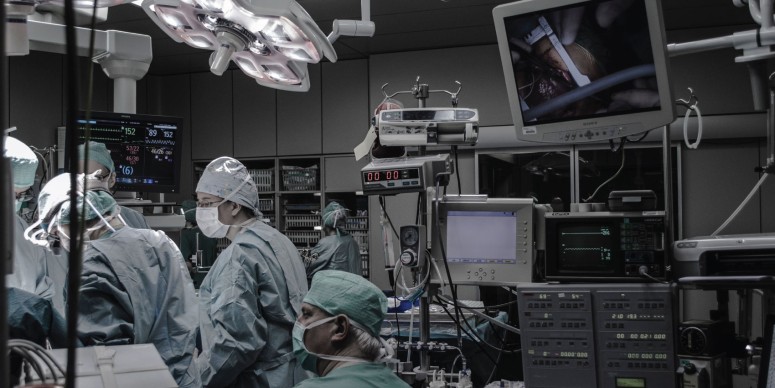Today’s post is dedicated to four technologies — Big Data, Virtual Reality, Artificial Intelligence and Blockchain to be exact — that are the biggest gamechangers and pièce de résistance of digital transformation in healthcare. Digital is changing pharma and healthcare in many ways. We have already dedicated an article to
digital transformation in the pharmaceutical sector a few months back and will delve into healthcare’s digital transformation trends today.
With the special focus on new technologies, such as big data, virtual reality, artificial intelligence and blockchain, we will discover what this new decade has in stock for healthcare. In the graphic below, we can observe some of the key developments in the market.When we speak about healthcare big data, we refer to collecting, analyzing and leveraging consumer, patient, physical, and clinical data. It aggregates information from social media, eCommerce, online and financial transactions, and is capable of identifying patterns and trends for future use.
The main
benefits of big data for the healthcare industry are:
Big data will reduce medication errors. By carrying out a patient record analysis, the software will find any inconsistencies between a patient’s health and drug prescriptions. That alerts the health professionals and patients of the risk of a medication error.
Big data will facilitate preventive care. Recurring patients account for up to 28% of the visits to the emergency rooms. With a little push from the big data analysis, the hospitals could identify these people and concentrate on creating preventive plans.
Big data will be the foundation of more accurate staffing. Having big data’s predictive analysis would permit the hospitals to have an estimation of future admission rates and allocate the necessary staff to deal with patients. This will save the hospital money and reduce emergency room wait times.Although
Medical Virtual Reality is a relatively new field, it has already moved the imagination of clinical researchers and real-life medical practitioners. As a result, there are already some examples of it having a positive effect on the lives of patients and the work of physicians.
The main
benefits of virtual reality for the healthcare industry are:
Virtual reality will help to train surgeons or to hone their skills. Those practice operations have already proven to be better than most traditional training methods. In fact, as this
Harvard Business Review study concluded: VR-trained surgeons improved their surgical performance by 230% compared with others.
Virtual reality can be of use to help the patients relax. VR technology is currently used to treat pain, anxiety, post-traumatic stress disorder and stroke. VR can also be used to get women through labor pain.
Virtual reality can speed up recovery in physical therapy. By bringing a gamified approach to physical therapy can make the rehabilitation journey more enjoyable. There’s also evidence, that, virtual reality therapy had a positive effect on children with cerebral palsy.In many ways,
artificial intelligence (AI) is the epitome of medical innovation and many industry players have already or are eager to invest millions in it. AI can perform many tasks that are typically carried out by humans in less time and at a fraction of the cost. But instead of costing people their jobs or losing the human contact that is often feared, AI tools could help the staff to have time for the tasks where they are indispensable.
Deloitte distinguishes three main categories for AI applications in healthcare:
Patient-oriented AI improves experiences, costs, and outcomes. Patient self-service to chatbots that emphasizes choice and convenience will permit them to complete tasks, like appointment scheduling, bill paying or form updating more rapidly and easily.
Clinician-oriented AI will provide tools for more effective diagnoses and treatment. Computer-aided detection (CAD) systems are already of great assistance for diagnosis by analyzing image data and associated clinical information. It is expected that CAD systems might become the primary interpreters of imaging studies and that radiologists will only review those that exceed a certain level of uncertainty.
Administrative- and operational-oriented AI will help to systematically assess the integrity of clinical documentation.Blockchain is another technology that materializes digital transformation in healthcare. As an effective tool to improve the accuracy of medical records and cutting costs, blockchain will considerably
safeguard the electronic health records (EHR). It can be beneficial for the
interoperability and integrity of the register.Technology and good knowledge of how to apply the new tools can give a new shape to many industries and build transformative experiences for the clients or users. With those four technologies at the forefrontont of digital transformation in healthcare, the decade to come looks quite promising.
Join the next edition of Global MBA and shape the future of business!
